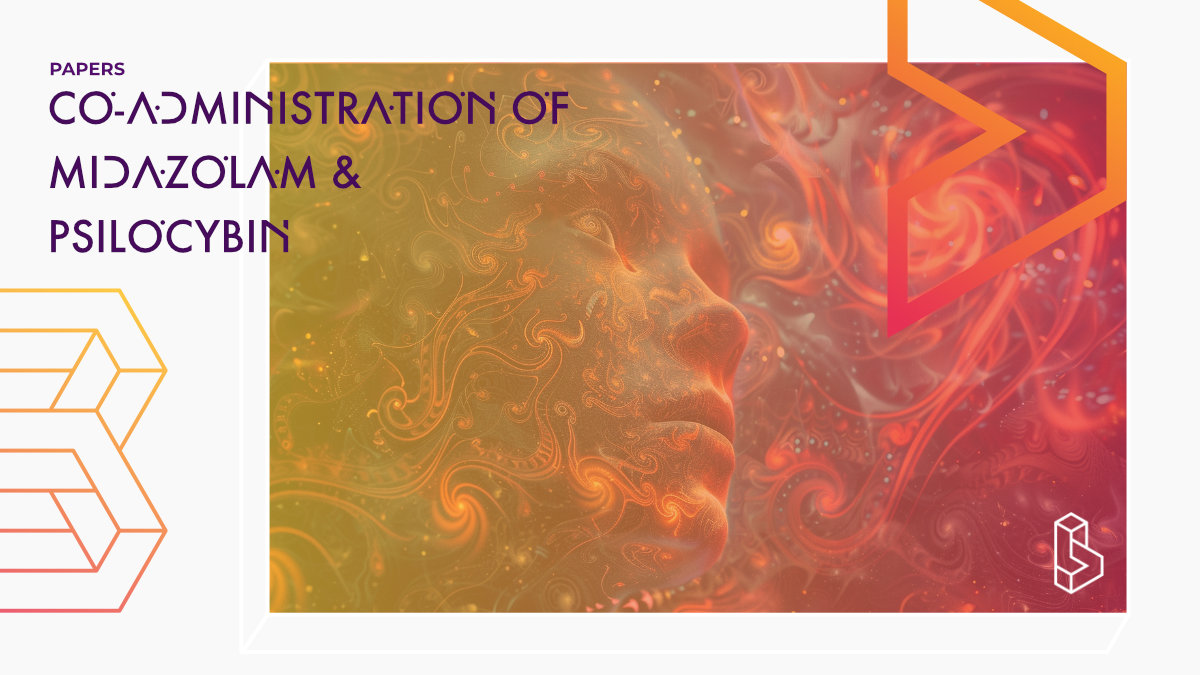This open-label study (n=8) co-administered psilocybin (25mg) with the amnestic benzodiazepine midazolam to assess the role of memory in the therapeutic effects of psilocybin. It finds that midazolam partially impaired memory while allowing a conscious psychedelic experience, with memory impairment inversely associated with salience, insight, and well-being induced by psilocybin, suggesting a role for memory in its therapeutic effects.
Abstract of Co-administration of midazolam and psilocybin
“Aspects of the acute experience induced by the serotonergic psychedelic psilocybin predict symptomatic relief in multiple psychiatric disorders and improved well-being in healthy participants, but whether these therapeutic effects are immediate or are based on memories of the experience is unclear. To examine this, we co-administered psilocybin (25 mg) with the amnestic benzodiazepine midazolam in 8 healthy participants and assayed the subjective quality of, and memory for, the dosing-day experience. We identified a midazolam dose that allowed a conscious psychedelic experience to occur while partially impairing memory for the experience. Furthermore, midazolam dose and memory impairment tended to associate inversely with salience, insight, and well-being induced by psilocybin. These data suggest a role for memory in therapeutically relevant behavioral effects occasioned by psilocybin. Because midazolam blocks memory by blocking cortical neural plasticity, it may also be useful for evaluating the contribution of the pro-neuroplastic properties of psychedelics to their therapeutic activity.”
Authors: Christopher R. Nicholas, Matthew I. Banks, Richard L. Lennertz, Cody J. Wenthur, Bryan M. Krause, Brady A. Riedner, Richard F. Smith, Paul R. Hutson, Christina J. Sauder, John D. Dunne, Leor Roseman & Charles L. Raison
Summary of Co-administration of midazolam and psilocybin
Serotonergic psychedelics such as psilocybin are associated with positive therapeutic outcomes in patients and enhanced well-being in healthy participants. Psilocybin, administered with psychological support, may promote psychological flexibility by promoting experiential engagement and openness to alternative beliefs about the self, others, and the world. Alternatively, or in addition, long-term memory of the psychedelic experience may contribute causally to long-term behavioral change.
The authors tested the idea that midazolam, an amnestic agent, could be used to separate the transformative experience from its memory by coadministering midazolam and psilocybin. The results suggest that midazolam impairs memory for the experience, potentially providing mechanistic insight into psilocybin’s therapeutic efficacy.
Methods
Find this paper
https://doi.org/10.1038%2Fs41398-024-03059-8
Open Access | Google Scholar | Backup | 🕊
Cite this paper (APA)
Nicholas, C. R., Banks, M. I., Lennertz, R. C., Wenthur, C. J., Krause, B. M., Riedner, B. A., ... & Raison, C. L. (2024). Co-administration of midazolam and psilocybin: Differential effects on subjective quality versus memory of the psychedelic experience. Translational Psychiatry, 14(1), 372.
Study details
Compounds studied
Psilocybin
Topics studied
Neuroscience
Headache Disorders
Study characteristics
Original
Open-Label
Bio/Neuro
Participants
8
Humans
Compound Details
The psychedelics given at which dose and how many times
Psilocybin 25 mg | 1x
